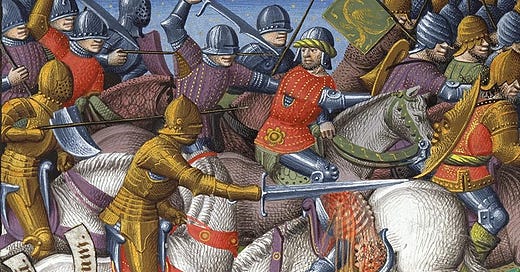If you are looking for the beginning of the study for The Song of Roland then you can go HERE for a brief introduction. At the bottom of the introduction you will find the links to each section of the study guide as it becomes available. If you would like to see the growing list of book studies available for free on this site you can go HERE. Enjoy!
Virtues/Vices/Great Ideas: (Find them in the Text)
Hate, Destruction
Grammar Questions: (The Information of the Text)
What did the Archbishop do for the French soldiers immediately prior to the beginning of the battle?
What did Roland feel compelled to admit to his friend Oliver right before the battle began?
Whom did Oliver say was “not to blame” for the bloody battle that was about to happen?
What did Adelroth (King Marsile’s nephew) receive from Roland for all his boasting?
What did the French peers typically do after having slayed one of the Spanish peers?
Who almost killed Oliver but just missed?
What was the fate of Chernubles?
According to Oliver, why had he not yet drawn his sword though his spear was badly broken?
What fascinating bit of information is mentioned about the paynim Siglorel?
What disturbing events are taking place back in France while Roland and his men are fighting the paynim horde?
Logic Questions: (Interpreting, Comparing/Contrasting, Reasoning)
Why might it have been helpful for the French soldiers to hear from Archbishop Turpin before going into battle?
Why did Roland now admit to Oliver that he was right about what he said concerning Ganelon betraying them?
The text describes Roland’s demeanor, stating, “Nobly he bears him, with open face he laughs.” Why might this behavior be helpful for his men to see?
Why did Roland chide his friend about still using his spear rather than his sword? Why might one be more appropriate than the other depending upon the situation?
What should we infer from the fact that all of the twelve “anti-peers” fall in battle before even one of the French peers does?
Rhetoric Questions: (The Analysis of Ideas in the Text)
In response to hearing the paynim Corsablis mocking the French forces the text tells us, “Archbishop Turpin has listened to his speech, and hates him worse than any man that breathes.” Do you think this response is consistent with the Christian faith Turpin represents? Why or why not?
Roland told Chernubles corpse, “Villains like you seek victory in vain.” This is a powerful line, of course, but is it true? Do evil men seek victory in vain or do they sometimes get what they seek? Feel free to offer some nuance in the way you choose to answer this.
The paynim Siglorel is said to have been led by Jupiter on a trip into Hell. What are some other famous pieces of literature which involve a similar trip?
The text tells us that not only will Ganelon be judged worthy of death for his crime but also that thirty of his family members will also die as a result. Do you think this is just or unjust? Explain your answer carefully.
Theological Analysis: (Sola Scriptura)
Read Psalm 5:4-6 and Psalm 26:5. How should these passages affect our thinking about the concept of hating someone?
How do we harmonize the previous passages from the Psalms with the teaching of our Lord in Matthew 5:43-48?
Read Joshua 7. How does this story relate to our current reading and how does it affect your thinking about these matters?
Read Matthew 27:45-54. How does this passage connect Laisse 110 of The Song of Roland?



